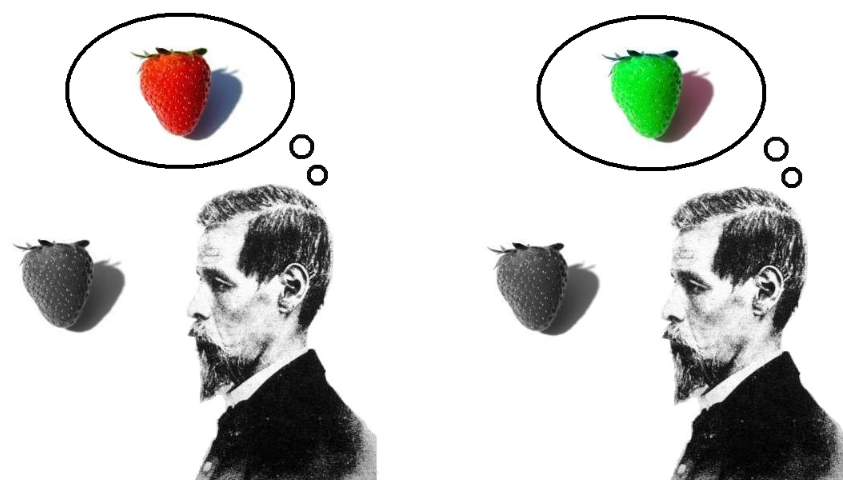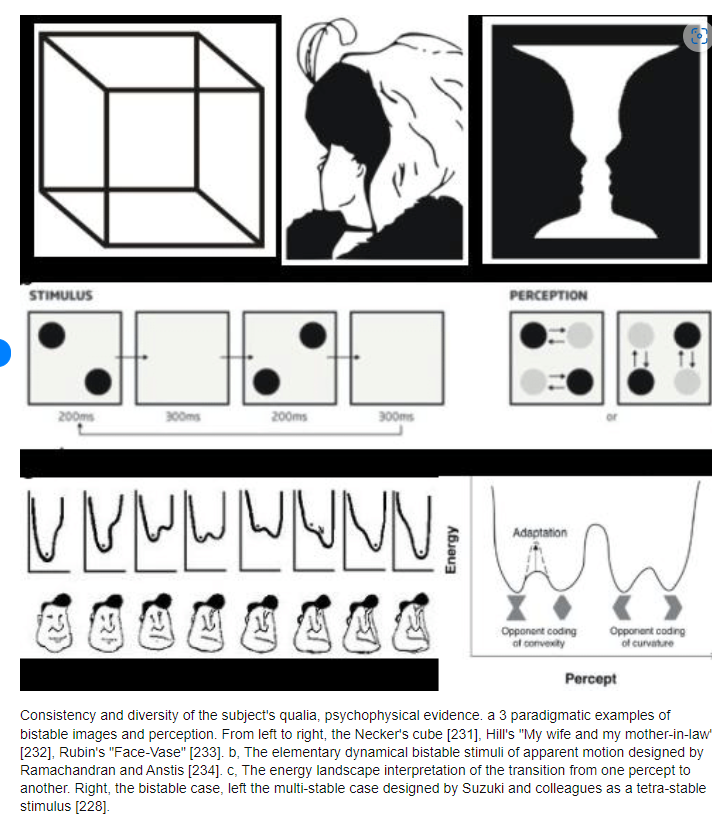
In an earlier essay (called ‘Consciousness & Qualia: Who Cares About ‘How They Seem To Us’?’) I discussed Philip Goff’s words, “consciousness is a datum in its own right”. I asked how Goff’s datum that is consciousness stands within the context of all the books and papers which he — and other people — have read on the subject of consciousness.

Basically, I asked whether any clear distinction at all can be made between such a datum and all the things philosophers and laypersons have written and said about such a thing.
My point was that if (as some people put it) qualiaphiles have read lots of (or even just some) books on consciousness (or, alternatively, if they’ve come across the word “qualia” many times), then surely that will impact on how they describe and/or theorise about any ostensibly (to use Goff’s words again) “private seemings” they may have.
The entire issue was summed up by saying that as soon as a (as it were) layperson starts to use the word “qualia”, then that’s precisely the moment that he or she stops being a layperson (i.e., at least when it comes to qualia). More to the point, the philosopher Patricia Churchland once said that the word “‘qualia’ is a term of art, which was introduced by philosophers”. [See note 1.]
Of course, such a layperson doesn’t need to be an expert, or to have read lots of academic papers on qualia.
All the above was put in more technical terms by Daniel Dennett in 1991.
Dennett argued (as quoted by Martin Kurthen) that talk of “consciousness” was largely down to a “huge complex of memes”.
In addition, the American philosopher Richard Rorty (also quoted by Kurthen) argued that
“to become aware of qualia is the same thing as learning how to make judgments about qualia”.
Of course (as we’ll see), qualiaphiles may well happily admit that “qualia” is a term which was indeed “introduced by philosophers”. However, they may add: So what! They may then argue that “qualia” is a term that was simply introduced to capture something that is real, and which has a reality regardless of the recent history of the term itself.
In any case, there are many ways to approach our descriptions of qualia. However, the whole issue is summed up by the neuroscientist and philosopher Martin Kurthen (who’ll be featured in this essay) when he tells us that
“[i]t is not helpful to view *the way things seem to us* as stable elements of our inner mental lives and thus as mental sub entities with a constant constitution at all”.
[See note 2.]
Kurthen then offers his readers his own alternative to this. He argues that the ways things seem to us are
“rather ephemeral phenomena, dependent on cultural, historical, evolutionary, linguistic, etc. — preconditions — and they can change with a modification of any of these preconditions”.
All the above ties in with another theme to be tackled in this essay: the distinction which can be made — and which has been made — between our descriptions of qualia, and qualia as they are (as it were) in themselves.
Qualia and Descriptions of Qualia

Martin Kurthen tells us that how we describe qualia may well
“crucially depend on a very special history and a very special constitution of a linguistic or, more general, social community”.
The claim that that qualia “depend on” these things may seem odd (or even bizarre) to some readers. Thus, such readers may ask the following question:
Do qualia themselves really depend on such descriptions?
In other words, perhaps qualia are as they are regardless of our descriptions.
Indeed, perhaps qualia are as they are regardless of (to use Kurthen’s terms again) history, language and our social community.
What can now be said is that to believe that there is a quale (to use Kant’s terms) Ding an sich is also to be a qualia realist.

Kurthen himself tackles this distinction when he refers to Richard Rorty’s position on “judgments about qualia”. He then notes what the qualiaphile may say in response:
“I also think it would be a short-sighted reply to this to say that by making judgments about qualia, we only reach *descriptions* of qualia as opposed to qualia *themselves*, namely their like-to-be-ness.”
Kurthen also uses the term “given” to classify qualia when they’re (supposedly) taken as they are in themselves. However, he then argues that such givens may change even if they’re still taken to be givens. Kurthen writes:
“If qualia intuitions change with social, cultural historical and evolutionary contexts, then the features of qualia (as seeming ‘*givens*’) themselves might be overformed by these outward social, etc. modifications of how the subject of consciousness *takes* these seemings. Wouldn’t this be just another example of how cognitive preconditions influence the further cerebral processing and thus the conscious appearance of sensory or cerebral activation patterns?”
As opposed to this sociological and historical take on qualia, we have an/the alternative, which Kurthen calls “cultural transcendentalism”.
Cultural transcendentalism isn’t just a realism in the sense that qualia are taken to be real (or to exist). It’s also a realism in the sense that it’s argued that we get qualia as they’re given — even if we do later describe them!
So can we really make the (as it were) anti-realist move from stating that our descriptions of qualia
“depend on a very special history and a very special constitution of a linguistic or, more general, social community”
to also stating the following? -
Qualia themselves (i.e., regardless of our descriptions) depend on a very special history, and a very special constitution of a linguistic or, more general, social community.
Qualia Within Total Cognitive Systems

Martin Kurthen then approaches this issue from another angle.
He argues that qualia (or what we say about qualia) must surely be a result of what he calls our “total cognitive systems”. In other words, how we describe qualia isn’t just a historical and sociological issue.
How could anyone dispute that?
After all, qualia don’t occur in literal isolation.
What’s more, qualia certainly aren’t described in isolation.
Instead, according to Kurthen,
“qualia as phenomena occur in the same total cognitive system that is also subject of qualia intuitions and judgments about qualia, so that features of qualia might well be overformed by modifications of how the subject of consciousness *takes* these seemings”.
Thus, two things occur within the total cognitive systems of human subjects:
(1) Human subjects have “qualia intuitions”.
(2) Such subjects make judgments about their qualia.
Now as far as (1) is concerned: how seriously should we take people’s intuitions about qualia in the first place? And (2) was discussed earlier: can we truly separate people’s judgments about qualia from qualia in themselves?…
So what are qualia in themselves?
Tell me something about them.
When (or if) a qualiaphile answers that question, then he must surely make judgments about his and other people’s qualia. Thus, aren’t we back to judgments-about-qualia again?
Qualia Narcissism

In much broader terms, Martin Kurthen expresses his somewhat rhetorical — and even psychoanalytic — position on why qualia are discussed so much (i.e., both inside and outside philosophical literature). He writes:
“There certainly is such an aspect of narcissism and inflation of the subject in our incessant re-flection on subjectivity and the ‘genuinely subjective’ features of the mind.”
Of course, even if Kurthen’s claim in the above passage is true, there still may be serious epistemological and metaphysical problems with qualia — at least as far as naturalism is concerned. That said, Kurthen does (at least implicitly) note this (as we’ll now see).
Kurthen then reins himself in and adopts a (as it were) metaphilosophical approach. He writes:
“The propensity to assign a sort of epistemological or ontological significance to phenomenality is, in my opinion, an expression of our modern tendency to view our own subjectivity with all its phenomenal *presence* and *immediacy* an epistemologically and/or ontologically exceptional entity or constitution.”
It can be said that there is indeed a “modern” obsession with subjectivity. Yet, as stated a moment ago, there may still be a problem for the naturalisation of qualia and/or subjectivity.
So readers must now note that Kurthen doesn’t state the following:
There has been a modern propensity to assign significance to phenomenality.
Instead, he states this:
“The propensity to assign a sort of epistemological or ontological significance to phenomenality [].”
Here the relevant and important words are “epistemological or ontological”. So everyone can happily accept that qualia are important to us. After all, if qualia exist as the qualiaphiles say they do, then we’re experiencing qualia almost all our waking hours. Indeed, some people even deem qualia to be at the heart of what makes human subjects persons.
So, in this story at least, it’s no wonder that human persons assign significance to qualia…
However, what about the epistemological and metaphysical conclusions and theories of those philosophers and laypersons who’re also qualiaphiles?
Notes:
(1) At first glance at least, what Patricia Churchland says about “qualia” must surely be true of many — even all — other philosophical terms too!
(2) In the above, all the quotes from Martin Kurthen come from his paper ‘On the Prospects of a Naturalistic Theory of Phenomenal Consciousness’.









No comments:
Post a Comment